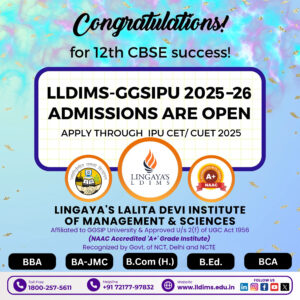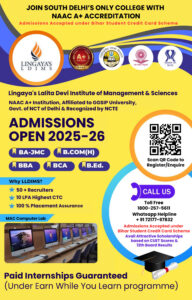
Top Career-Ready Courses After 12th: Explore Your path to Success at LLDIMS
Did you know that the course you choose after 12th grade can significantly impact your future career trajectory? With numerous options available, selecting the right one can be daunting. LLDIMS offers a range of career-ready courses designed to equip students with the skills needed for success in their chosen profession. At LLDIMS, the focus is on providing professional education that prepares students for the challenges of their future careers. By choosing LLDIMS, students can explore their path to success with confidence. Key Takeaways Navigating the Critical Post-12th Decision The moment you complete your 12th grade, you’re at a crossroads that demands a thoughtful decision about your career path. This decision is not just about choosing a course; it’s about laying the foundation for your future career success. The Impact of Course Selection on Future Career Trajectory Selecting the right course after 12th is crucial because it directly influences your future career prospects. The right choice can lead to a fulfilling career, while the wrong one might result in a challenging journey ahead. It’s essential to consider how different courses align with your strengths, interests, and the demands of the industry. Understanding Your Aptitude and Career Goals To make an informed decision, it’s vital to understand your aptitude and career aspirations. This involves reflecting on your academic strengths, identifying your interests, and exploring career options that align with them. Institutions like LLDIMS offer guidance and counseling to help students navigate this process, ensuring they choose a course that is right for them. By carefully evaluating your options and considering the implications of your choice, you can set yourself on the path to a successful and rewarding career. LLDIMS, being one of the best private colleges in Delhi NCR, provides a range of courses that cater to diverse career aspirations, helping you achieve your goals. Courses After12th: Career Pathways That Define Your Future As the job market continues to evolve, choosing the right course after 12th becomes a pivotal decision in shaping one’s future career. The landscape of career opportunities is constantly changing, driven by technological advancements and shifting industry demands. Emerging Career Trends in 2025 and Beyond The job market is witnessing a significant shift towards emerging technologies and innovative fields. Careers in data science, artificial intelligence, and cybersecurity are becoming increasingly prominent. Students opting for courses like BCA or BBA are likely to find opportunities in these growing sectors. According to recent trends, career after BCA and career after BBA are expected to be highly sought after, with a focus on digital transformation and data-driven decision-making. Aligning Education with Industry Requirements LLDIMS recognizes the importance of aligning its courses with industry needs. By doing so, it ensures that students are equipped with the skills required to succeed in their chosen careers. The institution’s focus on practical learning and industry connections helps bridge the gap between academia and professional expectations. Course Career Opportunities Industry Trends Bachelor of Computer Applications (BCA) Software Development, Data Analysis, Cybersecurity High demand for tech professionals Bachelor of Business Administration (BBA) Management, Marketing, Finance, HR Growing need for business leaders By choosing the right courses after 12th, students can position themselves for success in their future careers, taking advantage of emerging career trends and industry requirements. LLDIMS: A Center of Excellence for Professional Education LLDIMS stands out as a leading center for professional education, fostering a culture of innovation and learning. With a strong commitment to academic excellence, the institution has established itself as a premier destination for students seeking high-quality education. Institutional History and Reputation LLDIMS boasts a rich institutional history, built on a foundation of academic rigor and a commitment to producing industry-ready graduates. As one of the best private colleges in Delhi NCR, LLDIMS has garnered a reputation for excellence, attracting students from diverse backgrounds. Academic Philosophy and Teaching Methodology The academic philosophy at LLDIMS is centered around fostering a culture of learning and innovation. The institution’s teaching methodology is designed to equip students with practical skills and industry insights, ensuring they are well-prepared for the workforce. By focusing on a student-centric approach and incorporating industry requirements into the curriculum, LLDIMS ensures that its graduates are highly sought after by employers. Commerce & Management Pathways for Career Success LLDIMS offers a range of programs designed to equip students with the skills and knowledge needed to excel in commerce and management. The commerce and management fields are diverse, with various career paths that cater to different interests and aptitudes. At LLDIMS, students can choose from comprehensive programs that prepare them for the challenges of the modern business world. Bachelor of Commerce (B.Com) Program Overview The Bachelor of Commerce (B.Com) program at LLDIMS provides a thorough understanding of commerce, finance, and business practices. This program is designed to foster a deep understanding of commercial principles and practices. Curriculum Highlights and Specializations The B.Com curriculum includes a range of subjects such as accounting, economics, and business law. Students can also choose from various specializations to tailor their education to their career goals. Career Opportunities After B.Com Graduates of the B.Com program can pursue a variety of career paths, including roles in accounting, banking, and financial management. The program’s comprehensive curriculum prepares students for the demands of the industry. Career Path Job Roles Industry Accounting Accountant, Financial Analyst Finance, Banking Banking Bank Manager, Financial Advisor Banking, Finance Bachelor of Business Administration (BBA) Program The Bachelor of Business Administration (BBA) program focuses on developing core business competencies and leadership skills. This program is ideal for students who aspire to leadership roles in business. Core Business Competencies Developed The BBA program covers essential business subjects, including marketing, human resources, and operations management. Students develop a broad understanding of business principles and practices. Leadership and Management Skills Training Through the BBA program, students are equipped with leadership and management skills that are critical for success in the business world. The program emphasizes practical learning and industry exposure. Technology & IT Career Pathways at LLDIMS LLDIMS offers a comprehensive range of





